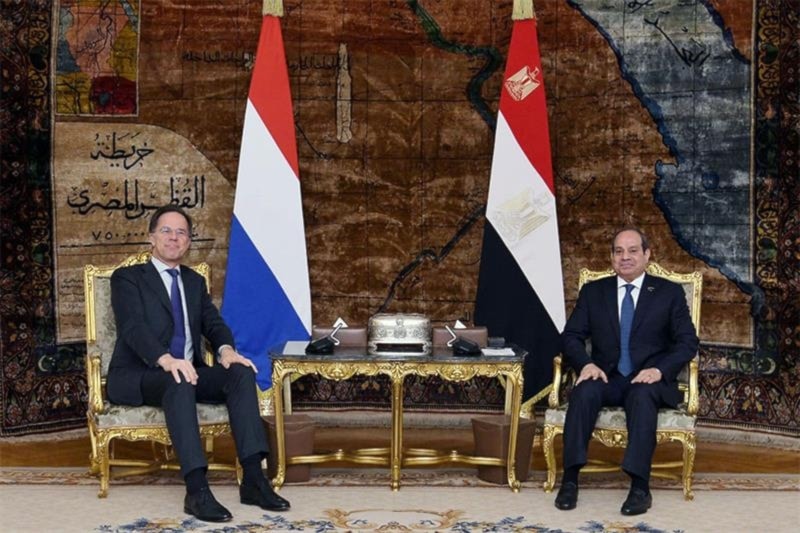Egypt's Sisi warns of catastrophic consequences if Rafah is invaded
Speaking with the Dutch PM, the Egyptian President emphasizes the critical significance of putting an end to the war on Gaza.
-

Egypt's President Abdel-Fattah al-Sisi with Dutch Prime Minister Mark Rutte during their meeting on Wednesday, March 13, 2024. (Egyptian Presidential spokesman courtesy)
Egyptian President Abdel Fattah El-Sisi and Prime Minister of the Netherlands Mark Rutte held a phone call on Wednesday, according to the Presidency's spokesperson, Dr. Ahmed Fahmy.
El-Sisi and the Dutch Prime Minister addressed bilateral ties and measures to strengthen collaboration on all political and economic levels, in line with the current trend in Egyptian-European relations.
The two leaders also discussed the war in Gaza and Egypt's attempts to restore regional calm by establishing a ceasefire and allowing humanitarian aid into the enclave.
El-Sisi emphasized the critical significance of putting an end to the present war, reiterating his warning against any military operations in the Palestinian city of Rafah, which would have disastrous effects on the population, and by extension on regional peace and security.
The Egyptian President emphasized the need for the international community to take responsibility for implementing relevant UN resolutions.
El-Sisi and Rutte agreed on the importance of working toward a ceasefire and securing the passage of humanitarian supplies to all parts of Gaza to safeguard it from the catastrophic humanitarian crisis in the Strip.
They also stressed the need to move on with the implementation of the "two-state solution" to help restore regional stability and promote security and peace in the area.
UN experts warn US Gaza aid pier to facilitate Rafah invasion
The US scheme to construct a large pier off the Gaza coast for humanitarian aid delivery has been criticized as a "smokescreen" to facilitate the potential Israeli invasion of the southern city of Rafah, The Independent reported Wednesday, citing UN officials.
Scheduled to be operational by early May, the pier allegedly aims to boost aid deliveries to the Gaza Strip by bypassing the Israeli-occupied land routes.
However, UN officials caution that the dock will not be positioned near northern Gaza, where the famine risk is most acute, but rather at a location monitored by an Israeli occupation military checkpoint, according to The Independent.
The UN officials indicated that the Israeli occupation forces would then exploit the pier for their invasion of Rafah as an alternative to land crossings that would be shut down during the operation.
"One of the key arguments for having a dock was to put it further north so that suppliers could come in more directly to the north," a UN official was quoted as saying.
The official further remarked that the current proposal seems more like a cover for a potential Israeli invasion of Rafah, where over a million Palestinians are sheltering.
State Department spokesman Matthew Miller told reporters in early April that the US still opposes "Israel's" plans to launch a ground invasion of Rafah after Israeli Prime Minister Benjamin Netanyahu scheduled a date for the assault.
The Pentagon announced Tuesday that the US will begin construction "very soon" on the pier.

 3 Min Read
3 Min Read








